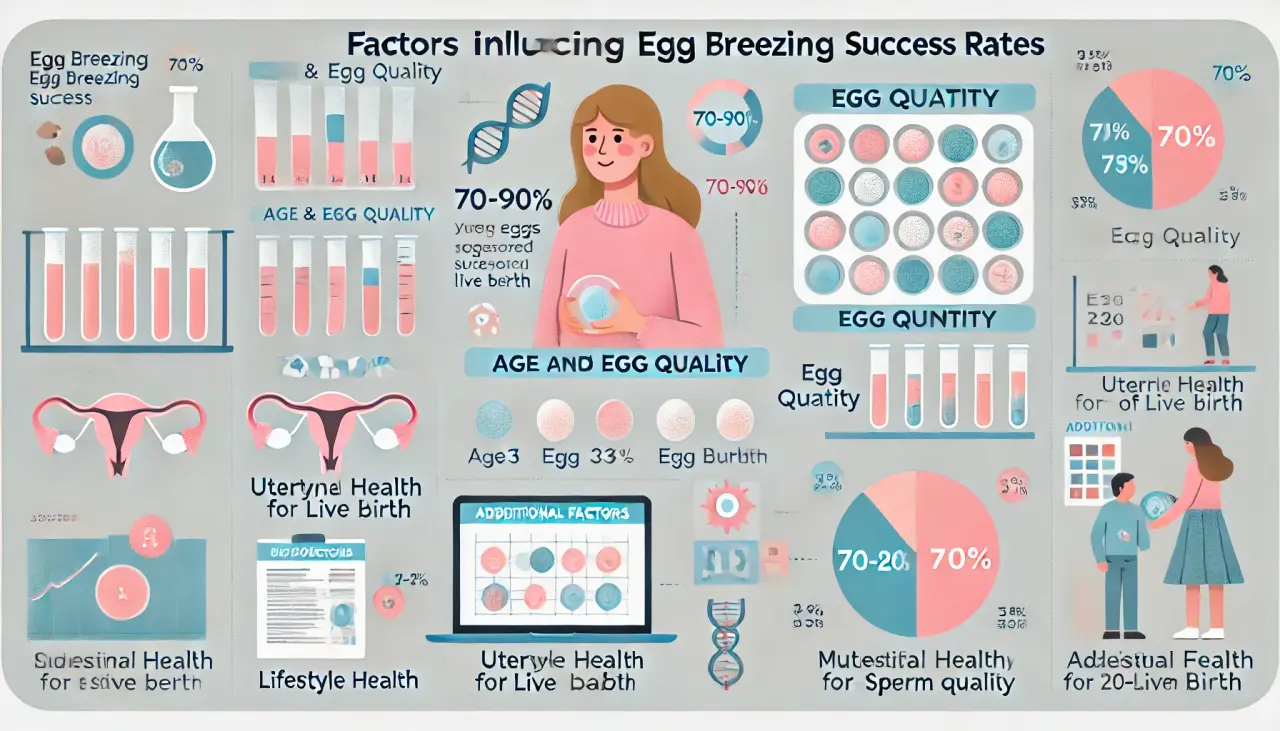
Egg Freezing Success Rates: Factors Influencing IVF Treatment with Frozen Eggs
Egg freezing, also known as oocyte cryopreservation, has become a prominent fertility option for women who wish to preserve their eggs for future use. Each year, numerous successful pregnancies and births are achieved using frozen eggs, with outcomes showing no significant abnormalities. In fact, babies born from frozen eggs have been found to have similar health outcomes to those conceived through traditional fertilization, including:
- No increased chromosomal abnormalities
- Normal birth weights
- Healthy organ development
This article delves into the factors that influence egg freezing success rates, including age, the number of eggs frozen, and other elements that play a role in determining the likelihood of a successful pregnancy after undergoing IVF with frozen eggs.
1. What Does New Research Reveal About Egg Freezing Success Rates?
One of the major challenges in egg freezing has been accurately determining its success rates, primarily due to the rapid technological advancements in egg freezing methods and the slow accumulation of data. However, recent developments in mathematical modeling have provided a more reliable way to predict egg freezing success rates. This model takes into account two critical factors: the woman’s age at the time of egg freezing and the number of eggs stored.
For example, a recent study conducted at Brigham and Women’s Hospital in Boston examined the outcomes of 520 healthy women and found the following:
- Women under 35 who froze 10-20 eggs had a 70-90% chance of a live birth.
- If these women underwent an additional stimulation cycle to increase the number of frozen eggs to 20, their success rate exceeded 90%.
These findings highlight the importance of egg quantity and age in predicting the chances of a successful pregnancy after egg freezing, particularly when paired with IVF treatment using frozen eggs.
2. How Important Is Age in Determining the Success of Egg Freezing?
Age is a critical factor in determining the success rates of egg freezing, with younger women typically experiencing better outcomes. As a woman ages, her fertility naturally declines, and this decline accelerates after the age of 30. The quality of eggs deteriorates with age, which in turn impacts the chances of developing healthy embryos.
Key reasons why age matters in egg freezing success include:
- Better-quality eggs: Younger women tend to produce eggs with fewer genetic abnormalities, leading to healthier embryos and higher chances of a successful IVF outcome.
- Higher ovarian reserve: Younger women typically respond better to stimulation cycles, producing a larger number of eggs for freezing, which increases the chances of a successful pregnancy.
- Improved IVF response: Younger women are more likely to have a positive response to IVF treatment with frozen eggs, further boosting the likelihood of pregnancy.
Therefore, freezing eggs at a younger age is recommended to maximize the success rates of IVF with frozen eggs, allowing women to maintain fertility options for the future.
3. Other Factors That May Affect Egg Freezing Success Rates
While age and egg quantity are primary determinants, other factors can also influence the success of egg freezing and subsequent IVF procedures. These include:
- Regular menstrual cycles: Women with regular cycles tend to have more predictable ovulation, which helps in the egg retrieval process.
- Uterine health and environment: A healthy uterus is essential for embryo implantation and successful pregnancy after IVF with frozen eggs.
- Fertility health issues: Pre-existing fertility conditions, such as endometriosis or polycystic ovary syndrome (PCOS), can impact egg quality and retrieval success.
- Sperm quality: The quality of sperm used for fertilizing the eggs also plays a crucial role in determining the success of IVF with frozen eggs.
- Lifestyle habits: Factors like smoking, excessive alcohol consumption, obesity, and high levels of stress can adversely affect egg quality and reduce the success rates of both egg freezing and IVF treatments.
Considering all these factors during the egg freezing process can help improve the chances of a successful pregnancy.
4. Conclusion on Egg Freezing Success Rates
With advancements in IVF treatment using frozen eggs, egg freezing success rates have seen a significant improvement. The introduction of data-driven models to assess success based on a woman’s age and egg quantity provides a more accurate prediction of outcomes, helping women make informed decisions about egg freezing and their fertility options.
Ultimately, while age remains one of the most significant factors in determining the success of egg freezing, other elements, such as lifestyle choices and fertility health, must also be considered. By understanding and addressing these factors, women can improve their chances of success with egg freezing and IVF treatment using frozen eggs.